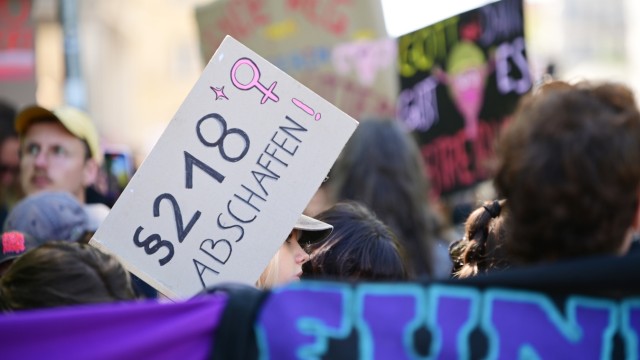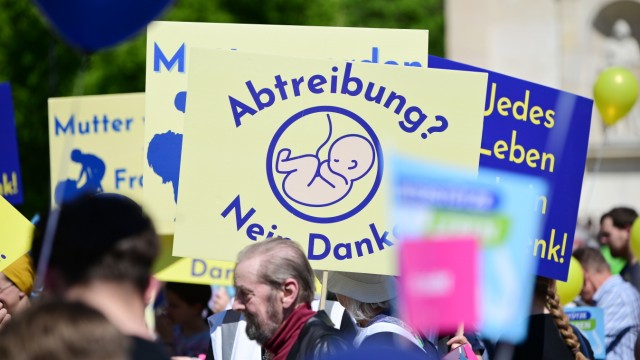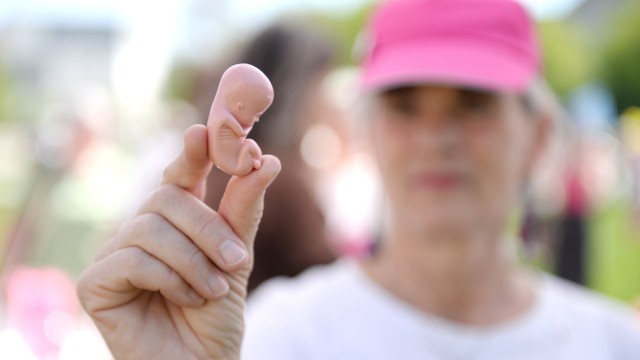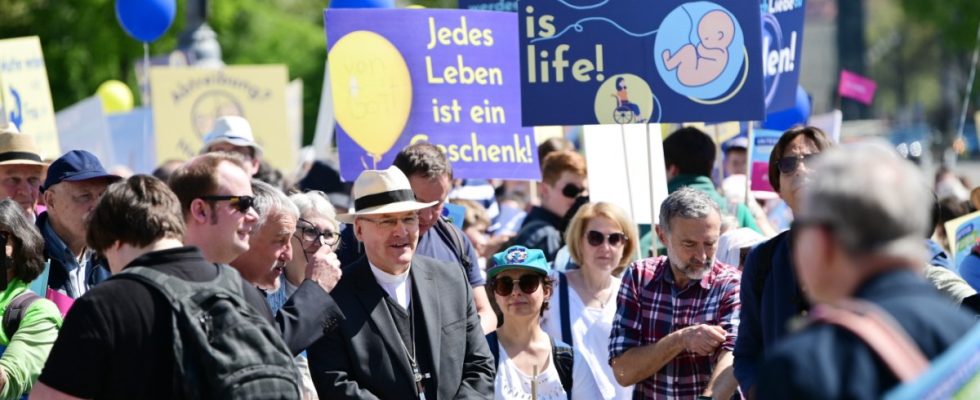Around 3,000 people took part in a “March for Life” called for by abortion opponents on Saturday in downtown Munich. Not only were there fewer people than last year, but they were also far from the 8,000 people the organizers had expected. According to police information, around 1,000 Munich residents demonstrated against the march, which was called for by so-called pro-life activists and Catholic bishops, but also Christian fundamentalists and right-wing groups.
The abortion opponents gathered on Königsplatz, their critics right next door on Katharina-von-Bora-Straße. The police deployed several hundred officers to keep the two groups separated. According to initial information from the officials, this was successful during the parade through Maxvorstadt, apart from a few minor provocations and the robbery of a poster.
The Munich rallies were particularly explosive given the current debate in Germany. On the one hand, a law should prohibit the harassment of women in front of counseling centers and doctors’ offices by militant abortion opponents as an administrative offense. There is also a proposal from an expert commission to legalize early abortions. Activists from the Munich alliance “Together against the right” protested on Monday morning with a banner on the Bavaria against the anti-abortion rally.
Abortion supporters demonstrate in the immediate vicinity of Königsplatz.
(Photo: Robert Haas)

Abortion supporters’ clear position: Society should not determine women’s bodies, but only women themselves.
(Photo: Robert Haas)
Abortions cannot be banned, it was said on posters and in speeches at the counter-demonstration organized by the Pro Choice alliance and other groups – bans only prevent safe abortions and endanger the health and lives of women. Speakers sharply criticized the abortion opponents. It was said that anyone who did not correspond to their traditional family image would be excluded. And: “They don’t want the woman to decide about her body, but rather society.”
In front of a poster showing this traditional family with father, mother, son and daughter on Königsplatz, the journalist Birgit Kelle not only spoke against abortions, but also against surrogacy – the subject of her current book. According to Kelle, the rally is a signal to women: “We won’t leave you alone. We’re happy that you’re becoming mothers.”
“Becoming a mother – you can’t be more of a woman” could be read on numerous posters. Others read: “Fathers become heroes through love.” The woman as mother, the man in his “God-given role as protector and defender of life”: This image ran through the speech of the British anti-abortion activist Isabel Vaughan-Spruce. In her speech, given in English, she cited Father Maximilian Kolbe, who was murdered in Auschwitz, as a role model and made a comparison that indirectly relativized the Nazi crimes: “History repeats itself.”
The Catholic Bishop of Regensburg, Rudolf Voderholzer, was – as announced in advance on his website – among the participants who willingly allowed himself to be photographed. The Passau Bishop Stefan Oster thanked the participants for their “uncompromising commitment” in a greeting published in advance. His Eichstätt brother, Gregor Maria Hanke, made a similar statement, but at the same time warned that “our constitutionally required and Christian-motivated cause should not be hijacked by groups that instrumentalize the commitment to protecting life for other political purposes that we neither as free democratic citizens and certainly cannot approve of them as believing Christians.

This year, significantly fewer abortion opponents came to the demonstration on Königsplatz than the year before.
(Photo: Robert Haas)

Plastic fetuses were offered at the “Sundays for Life” stand.
(Photo: Robert Haas)
A warning for a specific reason. Last year had Right-wing extremists used the environment of the Munich “March for Life” for their own actions. Last week, the Competence Center for Democracy and Human Dignity (KDM), set up by the Bavarian bishops in 2018, recommended staying away from the “March for Life”. This is reported by the Catholic News Agency (KNA). In recent years, radical and extreme right-wing actors have taken part, the KDM said in response to a KNA request. The organizers are making no effort to clearly distance themselves from right-wing extremists.
This year there were calls from the partly right-wing extremist AfD to take part in the Munich “March for Life”. As in previous years, the rally was moderated by a man whom the city-funded right-wing extremism information center (Firm) classifies as an “AfD-affiliated official.” The company has its own brochure This year we dealt with the actors in the “March for Life”. The specialist information center describes the anti-abortion rally as “one of the largest extreme right-wing and anti-feminist mobilizations in recent times.”
Silja Fichtner from the Munich association “Voice of the Silent” does not challenge the criticism. In a text that she published online in advance, she accused the march’s opponents of a “culture of death and lies.” Their tactics “mainly have to do with the fact that people don’t want to deal with the position of protecting life.”
“Today you are already considered right-wing extremist (…) if you acknowledge the biological fact that there are only two genders and if you maintain that a marriage consists of a man and a woman,” writes Fichtner. Therefore, it is “questionable who this label is actually supposed to scare.” There is no distancing from the right-wing scene in Fichtner’s text. It is simply “irrelevant,” she writes about the participants in the “March for Life,” “what their favorite food is, where they go on vacation, whether they like to separate the garbage and which parties they vote for.”

